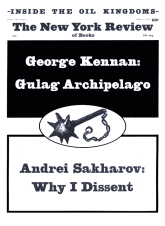In response to:
The Monster and his Myths from the January 24, 1974 issue
To the Editors:
I have hitherto never sought to reply to or to polemicize with reviewers of my books. But the review article on Stalin which appeared in your magazine on January 24 raises an issue of such importance that I am forced for the first, and I hope the last, time to break this rule. The issue is: how legitimate is it for a magazine of your standing to commission a review from a person, and for him to write it, on a subject in which he has demonstrated his utter disregard or ignorance of facts? I could adduce several examples to support this judgment, but one, I trust, will be enough. Mr. Hill is ironic about my assessment of the Mensheviks. Yet, let me put it to you, your readers, and the Master of Balliol whether one should take seriously any judgment about the Mensheviks or any other facet of Soviet and Russian history coming from a man who can write: “[after January, 1918] …the leaders of the Menshevik party disappeared from history as the coadjutors of the White Guards trying with the aid of foreign bayonets to demonstrate the impossibility of the socialist experiments of the Bolsheviks.”1 Anybody with a superficial acquaintance with modern Russian history will recognize the outrageous untruthfulness of this statement, but let me rehearse the facts. “In mid-1918 when the Soviet government was locked in military combat against the counterrevolutionaries and the interventionist armies… [the Mensheviks] moved closer to the Bolsheviks by pledging ‘unqualified support’ to the government and calling on their followers to join the Red Army…. Apparently in return for this loyalty the Bolsheviks legalized the Menshevik party in November, 1918.” The Mensheviks’ most prestigious leaders, Martov and Dan, called for “unconditional support of Bolshevism in its resistance to international imperialism and its internal and counterrevolutionary allies.”2 Were I to write and then maintain in print for over twenty years that the Levellers were agents of the French government, would Mr. Hill grant that I was a suitable reviewer for his books on English history?
Adam B. Ulam
Cambridge, Massachusetts
Christopher Hill replies:
I agree with some of Professor Cameron’s points. In my review I noted as an interesting fact that the authors of two serious books on Stalin, written from very different viewpoints, agreed in rejecting the Trotskyist myth without accepting the Stalinist myth; and I observed that freedom to reject one of these myths without having to rely on the other gave the historian writing now about the Russian Revolution an advantage over even so great a historian as Isaac Deutscher. Professor Cameron, I gather, prefers the Trotskyite myth. This is fair enough, but one doesn’t have to choose; and if one did have to choose literary merit would not necessarily be the best criterion. Any myth with the survival power of Stalinism must surely bear some relation to reality, which the historian should investigate: this has nothing to do with whether one likes it or not. I agree about the literary power and distinction of Trotsky’s History of the Russian Revolution, as of Clarendon’s History of the Rebellion; but the literary power of the latter is no reason for preferring his myth to—say—Oldmixon’s.
With reference to Mr. Ulam’s letter, it is not for me to defend your choice of a reviewer. I willingly admit to being no expert on the Russian Revolution. Mr. Ulam has to go back twenty-seven years to find anything written by me on the subject. For this reason, I tried to concentrate on methodological questions raised by the two interesting books I was asked to review. The reductio ad absurdum argument of Mr. Ulam’s last sentence, however, suggests an ironical addition to what I called the “recurrent situations” of revolutions: after their defeat, some of the Leveller leaders did in fact attempt to overthrow the Cromwellian régime in agreement with the Spanish government.
This Issue
March 21, 1974



